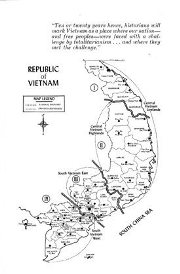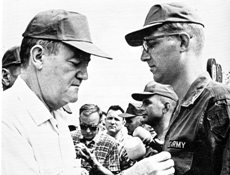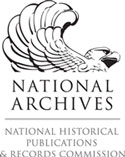What's New
Hubert H. Humphrey Digitization Project
This is the eighth installment of our NHPRC funded project to digitize Hubert H. Humphrey's speech texts. This month we focus on the years 1966 and 1967, the middle of Humphrey's tenure as Vice President of the United States.
By the beginning of 1966 Humphrey was back in the good graces of Lyndon Johnson. "Now commences the most startling chapter in Humphrey's life" wrote his biographer Carl Solberg, "The vice president who had opposed the president's war policy persuaded himself that Johnson was right, and emerged as the leading spokesman for the president's course on Vietnam" (Hubert Humphrey: A Biography, p. 285).
 At the end of 1965 Johnson sent Humphrey on a trip to
the Philippines, Japan, Taiwan and Korea. On January 3rd, 1966
Humphrey gave his impressions of these countries and of his
first trip traveling abroad for the president. In this speech he stated that
"the future of Asia is full of hope."
At the end of 1965 Johnson sent Humphrey on a trip to
the Philippines, Japan, Taiwan and Korea. On January 3rd, 1966
Humphrey gave his impressions of these countries and of his
first trip traveling abroad for the president. In this speech he stated that
"the future of Asia is full of hope."
 After being summoned to Hawaii by the president and
then sent on a tour of Vietnam, Humphrey gave a speech on February 19
at the Prime Minister's luncheon in Canberra. In this speech,
the previous version of which he had thrown away in one of his
many angry disagreements with his staff, he likened the
Communist oppressors in Vietnam with the forces that challenged
Europe and America in the 1940s. The Australian Prime Minister
Holt called it "the greatest speech I have ever heard in my
years of public life." Humphrey's staff were far less
enthusiastic (Hubert Humphrey: A Biography, p. 289).
After being summoned to Hawaii by the president and
then sent on a tour of Vietnam, Humphrey gave a speech on February 19
at the Prime Minister's luncheon in Canberra. In this speech,
the previous version of which he had thrown away in one of his
many angry disagreements with his staff, he likened the
Communist oppressors in Vietnam with the forces that challenged
Europe and America in the 1940s. The Australian Prime Minister
Holt called it "the greatest speech I have ever heard in my
years of public life." Humphrey's staff were far less
enthusiastic (Hubert Humphrey: A Biography, p. 289).
 Humphrey's wholehearted adoption of Johnson's
policies also did not win him support among his liberal friends
or university students who were already vehemently opposing the
war. On February 25, 1966 Humphrey addressed a dinner honoring
Reinhold Niebuhr, co-father of the ADA (Americans for Democratic
Action). Two hundred students paraded outside in protest as
Humphrey gave this speech that included the cautioning words "The great
tradition of social protest in America... has failings that crop
up regularly. One failing is over-simplification and another is
self-righteousness. Another is political naivety. Another is
sweeping impatience with everybody in authority -- The
Establishment and the Power Structure is what they are called
now. We had other names in my younger days but it meant the
same."
Humphrey's wholehearted adoption of Johnson's
policies also did not win him support among his liberal friends
or university students who were already vehemently opposing the
war. On February 25, 1966 Humphrey addressed a dinner honoring
Reinhold Niebuhr, co-father of the ADA (Americans for Democratic
Action). Two hundred students paraded outside in protest as
Humphrey gave this speech that included the cautioning words "The great
tradition of social protest in America... has failings that crop
up regularly. One failing is over-simplification and another is
self-righteousness. Another is political naivety. Another is
sweeping impatience with everybody in authority -- The
Establishment and the Power Structure is what they are called
now. We had other names in my younger days but it meant the
same."
 Despite continued and increasing protests at his
speeches Humphrey maintained his support of the president's
policies in Vietnam. In this March 11, 1966 speech to the National
Press Club Humphrey predicted that "Ten or twenty years hence,
historians will mark Vietnam as a place where our nation -- and
free peoples -- were faced with a challenge by
totalitarianism... and where they met the challenge" (p.15).
Despite continued and increasing protests at his
speeches Humphrey maintained his support of the president's
policies in Vietnam. In this March 11, 1966 speech to the National
Press Club Humphrey predicted that "Ten or twenty years hence,
historians will mark Vietnam as a place where our nation -- and
free peoples -- were faced with a challenge by
totalitarianism... and where they met the challenge" (p.15).
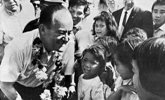 Though Humphrey was now almost totally in the
president's favor, the country showed little favor towards
either of them. Things were not going well in Vietnam where
troop numbers exceeded 380,000 by the summer of 1966. Johnson
increased the unpopular bombing in northern Vietnam in June.
Great Society proposals stalled in Congress at home.
Though Humphrey was now almost totally in the
president's favor, the country showed little favor towards
either of them. Things were not going well in Vietnam where
troop numbers exceeded 380,000 by the summer of 1966. Johnson
increased the unpopular bombing in northern Vietnam in June.
Great Society proposals stalled in Congress at home.
Civil rights protests continued to cause negative headlines as
well. James Meredith, first African-American student to attend
the University of Mississippi in 1962, was shot in a march he
helped organize from Memphis, Tennessee to Jackson, Mississippi.
On June 23 civil rights marchers in Mississippi were dispersed
with tear gas. At the National Association of Counties meeting
in New Orleans in July Humphrey proposed that he, too, would
react strongly if his living conditions were as horrible: "As
hot as it has been... I would hate to be stuck on the fourth
floor of a tenement with the rats nibbling on the kids' toes --
and they do -- with the garbage uncollected -- and it is -- with
the streets filthy, with no swimming pools,  with little or no
recreation -- I would hate to be put in those conditions, and I
want to tell you, if I were in those conditions -- if that
should happen to have been my situation... I have enough spark
left in me to lead a might good revolt under those conditions"
(pages 27-28). These ad-libbed words in an otherwise prepared speech
foreshadowed the summer riots that erupted in Cleveland, New
York, Chicago and Los Angeles that year. The administration was
seen by the media to condone unrest in America's cities.
with little or no
recreation -- I would hate to be put in those conditions, and I
want to tell you, if I were in those conditions -- if that
should happen to have been my situation... I have enough spark
left in me to lead a might good revolt under those conditions"
(pages 27-28). These ad-libbed words in an otherwise prepared speech
foreshadowed the summer riots that erupted in Cleveland, New
York, Chicago and Los Angeles that year. The administration was
seen by the media to condone unrest in America's cities.
Johnson was feeling his loss of popularity and arranged for Humphrey to do all of his campaigning that year. Though Humphrey tried to deliver the administration's message effectively to the American populace, 45 House seats and many important Senate races were lost by the Democrats.
1967 fared little better. Soured by the bad election year and
dropping polls, Johnson rarely visited college campuses and was
careful about his public appearances in general. Humphrey
however, accustomed to being in the midst of protests and
demonstrations, met with even more violence than usual. At a
Stanford University student panel discussion on February 20th
where Humphrey gave this  speech "four
hundred anti-war demonstrators mobbed his car, pushed placards
in his face, and shrieked: 'War criminal,' 'Murderer,' and
'Burn, Baby, Burn.' Several tried to crash through the cordon of
police, and one emptied a can of urine on a Secret Service man
defending the vice president. Another threw himself under the
front wheel of Humphrey's car but was dragged back by a
policeman" (Hubert Humphrey: A Biography, p. 303).
speech "four
hundred anti-war demonstrators mobbed his car, pushed placards
in his face, and shrieked: 'War criminal,' 'Murderer,' and
'Burn, Baby, Burn.' Several tried to crash through the cordon of
police, and one emptied a can of urine on a Secret Service man
defending the vice president. Another threw himself under the
front wheel of Humphrey's car but was dragged back by a
policeman" (Hubert Humphrey: A Biography, p. 303).
A week later Humphrey gave this  speech to the United
Jewish Appeal Young Leadership Cabinet where he bemoaned the
fact that, though it was laudable that students were able to
protest in a country like ours, still: "There is something quite
tragic and discouraging about young men and women, especially at
an institution of learning, not being willing to listen to
another point of view and to debate the great issues of our
time" (p. 2).
speech to the United
Jewish Appeal Young Leadership Cabinet where he bemoaned the
fact that, though it was laudable that students were able to
protest in a country like ours, still: "There is something quite
tragic and discouraging about young men and women, especially at
an institution of learning, not being willing to listen to
another point of view and to debate the great issues of our
time" (p. 2).
On March 22, 1967 Humphrey gave a  speech in
the cradle of the civil rights movement to the Birmingham Red
Cross Awards Program extolling their support of blood donations
to the cause in Vietnam. Although Humphrey saw himself as a
champion of civil rights, his loyalty towards Johnson was at
cross purposes with Martin Luther King, Jr.'s view of the war in
Vietnam. In April of 1967 King gave a speech
titled: Beyond Vietnam: A Time to Break the Silence in
which he named the Vietnam War as the biggest obstacle to the
civil rights movement. "A few years ago there was a shining
moment in that struggle. It seemed as if there was a real
promise of hope for the poor -- both black and white -- through
the Poverty Program. Then came the build-up in Vietnam, and I
watched the program broken and eviscerated as if it were some
idle political play thing of a society gone mad on war, and I
knew that America would never invest the necessary funds or
energies in rehabilitation of its poor so long as Vietnam
continued to draw men and skills and money like some demonic,
destructive suction tube. So I was increasingly compelled to see
the war as an enemy of the poor and to attack it as such."
speech in
the cradle of the civil rights movement to the Birmingham Red
Cross Awards Program extolling their support of blood donations
to the cause in Vietnam. Although Humphrey saw himself as a
champion of civil rights, his loyalty towards Johnson was at
cross purposes with Martin Luther King, Jr.'s view of the war in
Vietnam. In April of 1967 King gave a speech
titled: Beyond Vietnam: A Time to Break the Silence in
which he named the Vietnam War as the biggest obstacle to the
civil rights movement. "A few years ago there was a shining
moment in that struggle. It seemed as if there was a real
promise of hope for the poor -- both black and white -- through
the Poverty Program. Then came the build-up in Vietnam, and I
watched the program broken and eviscerated as if it were some
idle political play thing of a society gone mad on war, and I
knew that America would never invest the necessary funds or
energies in rehabilitation of its poor so long as Vietnam
continued to draw men and skills and money like some demonic,
destructive suction tube. So I was increasingly compelled to see
the war as an enemy of the poor and to attack it as such."
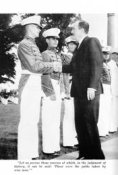 At the time King gave this speech,
Humphrey was in Europe dealing with anti-war protestors abroad
while visiting Switzerland, the Netherlands, Britain, Germany,
France, Italy and even meeting with the Pope. He was back in
time for more riots in numerous American cities that summer, a war in the
Middle East, another escalation of troops to Vietnam
by August of that year and a continuation of student
protests.
At the time King gave this speech,
Humphrey was in Europe dealing with anti-war protestors abroad
while visiting Switzerland, the Netherlands, Britain, Germany,
France, Italy and even meeting with the Pope. He was back in
time for more riots in numerous American cities that summer, a war in the
Middle East, another escalation of troops to Vietnam
by August of that year and a continuation of student
protests.
In a  speech to
the National Defense Executive Reserve on October 23, 1967
Humphrey still vehemently supported the president's policies on
Vietnam: "I support the President, and I support the course he is
following because I too believe that it is right, and no amount
of popularity that can be gained is worth the abandonment of
conscience" (p.22).
speech to
the National Defense Executive Reserve on October 23, 1967
Humphrey still vehemently supported the president's policies on
Vietnam: "I support the President, and I support the course he is
following because I too believe that it is right, and no amount
of popularity that can be gained is worth the abandonment of
conscience" (p.22). By late October Humphrey was again sent to
Vietnam and Southeast Asia, and made this speech at
the U.S. Embassy in Saigon where he exclaimed to the U.S.
Mission Staff: "This is our great adventure and a wonderful one
it is" (p. 15). People found his
words obscene (Hubert Humphrey: A Biography, p. 312).
By late October Humphrey was again sent to
Vietnam and Southeast Asia, and made this speech at
the U.S. Embassy in Saigon where he exclaimed to the U.S.
Mission Staff: "This is our great adventure and a wonderful one
it is" (p. 15). People found his
words obscene (Hubert Humphrey: A Biography, p. 312).
On November 18, 1967 Humphrey addressed the Young Democrats
National Convention in this  speech. In a note added to the speech,
handwritten on hotel stationary, Humphrey wrote: "If you don't
believe in yourself, your party or your President, how do you
expect others to believe in you? Never put poison in the well
from which you will have to drink." This staunch loyalty would be tested to the brink
of Humphrey's endurance in the events of the election year of 1968.
speech. In a note added to the speech,
handwritten on hotel stationary, Humphrey wrote: "If you don't
believe in yourself, your party or your President, how do you
expect others to believe in you? Never put poison in the well
from which you will have to drink." This staunch loyalty would be tested to the brink
of Humphrey's endurance in the events of the election year of 1968.
These speech texts, as well as all of Humphrey's speeches from 1941-1967 are linked to the inventory of his Speech Text Files. More of Humphrey's speeches will be made available each month throughout this project. Look for the first half of 1968 in April!
This project was awarded the support of a $46,000 grant from the National Historical Publications and Records Commission (NHPRC) administered by the National Archives.
Learn more about how the NHPRC helps preserve records of enduring national historical value and promotes their public access and interpretation through archival and documentary programs.
New and Updated Finding Aids - March 2013
| Name/Abstract | File No. |
|---|---|
| ALAN R. WOOLWORTH: An Inventory of His Papers | 00339 |
| Personal papers and research files of Alan R. Woolworth, a Minnesota historian and archaeologist, primarily concerning events and individuals from nineteenth century Minnesota. Research files and other records of his and his wife's consulting business, Woolworth Research Associates, are included. | |
| Architects' Small House Service Bureau: An Inventory of Its Records | 01085 |
| Correspondence, minutes, financial statements, newspaper clippings, printed and promotional materials, and related records of a regional and national organization, founded and headquartered in Minneapolis, that published and sold stock architectural plans for a variety of small homes, offered advice and counseling, and performed other professional services for people with limited incomes wishing to build small, well designed, and attractive homes. | |
| EDUCATION DEPARTMENT: An Inventory of Its Published Records and Reports | gr00435 |
| Reports, newsletters, and miscellaneous print and near-print items of or about the Education Department. The records cover all aspects of the department's duties and activities, including curriculum, rules and regulations, standards, administration, school finance, development, Indian education, instruction, foreign languages, pupil personnel services, libraries, management, planning, equal educational opportunity, professions development, school facilities and transportation, special education, statistics, teacher certification and placement, vocational rehabilitation, and vocational-technical education. | |
| F. T. (Frithiof T.) Gustavson and Family: An Inventory of Their Papers | 01083 |
| Biographical data, correspondence, writings, clippings, and photographs of Gustavson, operator of the Home Trading Company in Pequot Lakes, Minnesota, amateur archaeologist, student of aboriginal peoples and history of the area, superintendent of the Chippewa Museum in Cass Lake, Minnesota, and lecturer, tourism promoter and author. | |
| Future Now (Organization): An Inventory of Its Records | 01088 |
| Annual reports, articles of incorporation, bylaws, financial statements, minutes, administrative files, and client and potential client files of a Twin Cities-based consulting firm working to advance progressive issues through the training of and consultation with members of local environmental, neighborhood, cooperative, social justice, and similar organizations. | |
| GAMMA (Organization): An Inventory of Its Organizational Records | 00383 |
| Records of a social and athletic organization for gay men in the Twin Cities. | |
| Governor: An Inventory of Its Election Records | gr00696 |
| Materials created or accumulated by the Governor's Office in confirmation of the validation of elections and the electoral process. | |
| Human Rights Department: An Inventory of Its Records | gr00697 |
| Annual/biennial reports, minutes, commissioner's correspondence, topical background and subject files, news clippings, and published records a0nd reports documenting the main administrative activities and duties of the department. Included are records of the commission's predecessors, the Governor's Interracial Commission, Governor's Human Rights Commission, Fair Employment Practices Commission, and State Commission Against Discrimination. | |
| Hubert H. Humphrey: An Inventory of His Speech Text Files | 00442 |
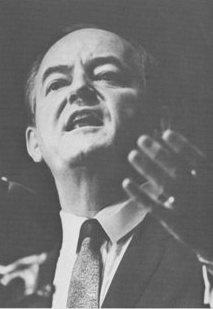 Copies of Humphrey's speeches, in varying formats
including notes, drafts, speaking texts, printed copies,
and transcripts. Also present are excerpts, sample
speeches, and incomplete indexes and checklists.
Copies of Humphrey's speeches, in varying formats
including notes, drafts, speaking texts, printed copies,
and transcripts. Also present are excerpts, sample
speeches, and incomplete indexes and checklists.
Includes digital content. |
|
| James R. Anderson: An Inventory of His Papers | 01087 |
| Biographical information, patents, product catalogs, reports, product information sheets, and other records compiled by Anderson while employed as a chief electronics engineer and founding partner of Research, Incorporated, a Minneapolis firm that designed, manufactured, and sold electronic instruments, communications devices, and heating devices to industrial customers. There is also some material pertaining to Anderson Business Computer Systems, Inc., the company Anderson incorporated in 1981 after leaving Research, Inc. and operated until its dissolution in 1988. | |
| Minnesota Transfer Railway Company: An Inventory of Its Records | 00487 |
| Minutes, stock certificates, annual reports, correspondence and subject files, financial and accounting records, operating analyses and monthly operating reports, maps and engineering drawings, payroll records, and miscellaneous legal papers of a St. Paul-based railroad company organized under the impetus of James J. Hill by a consortium of nine major railroads entering the Twin Cities to facilitate the transfer and handling of freight entering the cities by rail. | |
| Saint Paul Union Depot Company: An Inventory of Its Records | 00770 |
| Minutes (1897-1985), annual reports (1885-1980), correspondence and subject files (1910s-1970s), payroll records (1885-1970), accounting records (1879-1977), operating statements (1921-1975), engineering and architectural drawings (1889-1954), and miscellaneous legal and financial papers (1896-1955) documenting the existence of a now defunct company organized in 1879 to serve the nine major railroads entering the Twin Cities. The jointly owned and operated company controlled 9.24 miles of St. Paul trackage and terminal facilities, including the depot building. The company was operated in tandem with the Minnesota Transfer Railway Company, with effective control of both properties exercised by the same board comprised of representatives of the nine joint tenants. The current depot facility was built during 1919-1924; passenger service ceased in 1971. | |
| St. Paul Retired Teachers, Inc.: An Inventory of Its Records | 01089 |
| Articles of incorporation, constitutions and bylaws, historical compilations, newsletters, board activity files, annual historical books, a history of the organization, and a treasurer's book of this social, fund-raising, and advocacy organization of retired teachers in St. Paul. | |
| Theodore Christian Blegen: An Inventory of His Papers | p1666 |
| Kensington Runestone research files (1899-1968) and miscellaneous correspondence files (1878-1956) of Theodore C. Blegen (1891-1969), a University of Minnesota professor (1927-1939), dean (1940-1960), superintendent (1931-1939), and research fellow (1960-1969) at the Minnesota Historical Society. The runestone files generated in the 1960s while he was researching the stone, concern a large stone bearing runic inscriptions that were purportedly carved by Viking explorers, and which was found near Kensington (Douglas County), Minnesota in 1898. | |
New and Updated Catalog Records
| Name/Abstract |
|---|
| Bigelow, H. R. (Horace Ransom), 1820-1894. |
| Letters, photographs, a diary, and other papers of early St. Paul lawyer Horace R. Bigelow. |
| Chamberlain, Charles A. (Charles Addision). Charles A. Chamberlain and family papers, 1865-1905. |
| Papers of Charles A. Chamberlain of Ortonville, Minnesota, who served in the Civil War with the Second Minnesota Regiment. |
| Holman, Martin J. (Martin John). Farm account book and related papers, 1929-1937. |
| Farm account book (1929-1937) of Martin John Holman for his 240-acre farm in Otter Tail County, Minnesota and related papers. |
| Irish, Gail L. The Ribbon project papers, 1983-1993. |
| Correspondence, photographs, news clippings and printed materials, and a sound cassette documenting Minnesota’s participation in The Ribbon: A Celebration of Life, a grassroots anti-war project that encircled the Pentagon, headquarters of the United States Department of Defense, with quilts. |
| Kimball, Wilbur S. (Wibur Stanley). Wilbur S. Kimball papers, 1864-1894. |
| Papers of a Jackson, Minnesota man who served in the Civil War as a member of the Fourth Minnesota Regiment. |
| Roberts, Vincent, addressee. Letters received from family and acquaintances in Minnesota, 1864-1886. |
| Twenty-eight letters received by Vincent Roberts, a farmer, justice of the peace, and real estate and loan agent living at Iron Ridge, Dodge County, Wisconsin, from family and acquaintances discussing family matters and economic conditions in southern Minnesota. |
| Ronellenfitsch, Anthony, addressee. Letters received from servicemen, 1942-1945. |
| Letters received by Fr. Anthony Ronellenfitsch, O.S.B., pastor of St. Michael's parish in Mahnomen, Minnesota from three servicemen during World War II. |
| Tozer, Maude. Apron sketchbook, 1940-1960. |
| Notebook containing sketches, measurements, fabric descriptions, and other details of aprons made and sold by Minneapolis seamstress Maude Tozer. |
